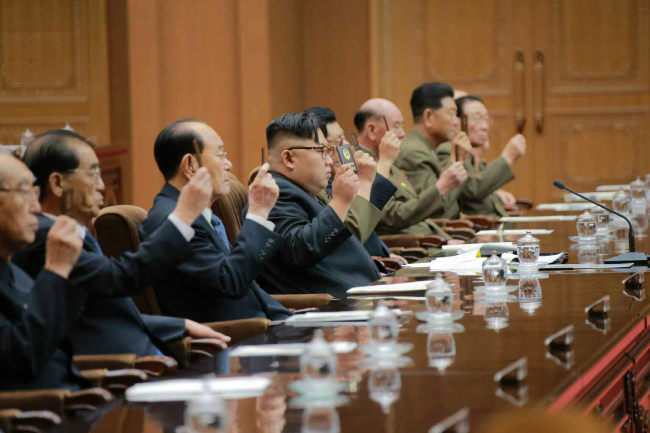Following last week’s government overhaul, North Korea’s armed forces ministry appears to have been relocated under the cabinet supervised by its prime minister, as leader Kim Jong-un continues to curb the military’s sway, an analyst said Monday.
State media’s recent dispatches signaled the shift in their introductions of Minister of People’s Armed Forces Pak Yong-sik. The ministry had been overseen by the National Defense Commission, the communist state’s potent top governing body, which was dismantled with the launch of the State Affairs Commission during a parliamentary meeting last week.
“This indicates that the ministry is now under the control of the cabinet instead of the now-defunct NDC,” said Cheong Seong-chang, head of unification strategy at the Sejong Institute who has been monitoring changes within the North’s top echelons for years.
 |
North Korean leader Kim Jong-un (fourth from left) is inducted as chairman of the new State Affairs Commission during a session of the Supreme People’s Assembly on Wednesday in an image carried on June 30 by the Rodong Sinmun. (Yonhap) |
“As a member of the SAC himself, Pak would now have to keep following Kim’s direct orders while actively reflecting instructions from the premier (Pak Pong-ju).”
Alongside the agency, the Ministry of People’s Security led by Choe Pu-il has also possibly been repositioned within the cabinet or the SAC, given his appointment to the fledgling organization.
The perceived transfer indicates the young leader’s ongoing drive to dilute the influence of the powerful, rigid military in his state governance, shying away from his late father’s “songun (military first)” mantra in favor of the party and cabinet playing a greater role, Cheong said.
“With the Armed Forces Ministry being in charge of military diplomacy and logistics and welfare programs, the decision was probably intended to facilitate the military’s cooperation in the cabinet’s economic campaign,” he added.
“As a result, the military’s traditionally robust standing is relatively weakening, whereas the influences of the party and the cabinet are growing further.”
But Seoul’s Unification Ministry remained cautious, saying more analysis is needed to confirm the move.
Other experts such as Yang Moo-jin, a professor at the University of North Korean Studies in Seoul, also noted that it was too early to come to a conclusion because Pyongyang had changed the Armed Forces Ministry’s name and then restored it again in the past.
“It is to be determined after collecting further information whether the Armed Forces Ministry’s affiliation has actually changed to the cabinet or it remains within the SAC, but with a different name,” ministry spokesperson Jeong Joon-hee said at a regular news briefing.
Last Wednesday, North’s rubber-stamp Supreme People’s Assembly unveiled the formation of the SAC and named Kim its chairman, which is the “top position” in the country.
But little has since been revealed other than the relaunch of the Committee for the Peaceful Unification of the Fatherland as an independent state organ in charge of inter-Korean affairs, detaching it from the party.
In another development, the official Korean Central News Agency on Sunday introduced Ma Won-chun, the formerly director of the NDC’s Designing Department, as from the SAC, though still with the same position.
By Shin Hyon-hee (
heeshin@heraldcorp.com)





![[Exclusive] Hyundai Mobis eyes closer ties with BYD](http://res.heraldm.com/phpwas/restmb_idxmake.php?idx=644&simg=/content/image/2024/11/25/20241125050044_0.jpg)

![[Herald Review] 'Gangnam B-Side' combines social realism with masterful suspense, performance](http://res.heraldm.com/phpwas/restmb_idxmake.php?idx=644&simg=/content/image/2024/11/25/20241125050072_0.jpg)
